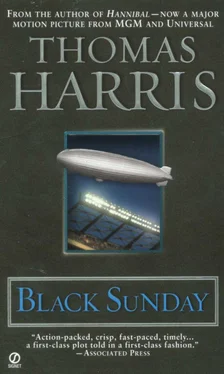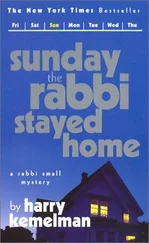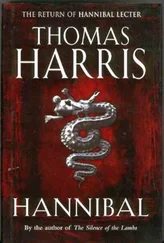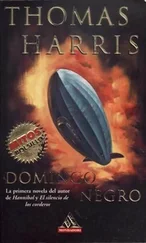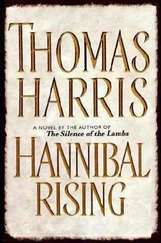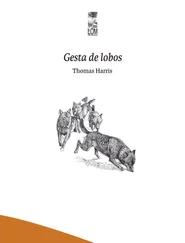His size prevented him from entering the booth, but he could reach inside and dial. He called Coast Guard Search and Rescue, identifying himself as a reporter for El Diario-La Prensa. The helpful young man at the Coast Guard communications center told him the details that could be gleaned from radio traffic concerning the Leticia and her missing captain and the pursuit of the speedboat.
Muzi drove along the Brooklyn-Queens Expressway overlooking the Brooklyn docks. On the pier beside the Leticia he could see both Customs and Port Authority police. He was relieved that neither the freighter nor the cutter flew the red swallowtailed Bravo that means dangerous cargo aboard. Either the authorities had not yet found the explosives or the speedboat had taken the plastic off the ship. If the speedboat had taken the plastic, which was very likely, then he had a little time as far as the law was concerned. It would take days for the authorities to inventory the Lericia’s cargo and pinpoint the missing shipment. Probably he was not yet hot with the law. But he was hot all right, and he could feel it.
Something was terribly wrong. It did not matter whose fault it was, he would be blamed. He had a quarter of a million dollars of Arab money in a bank in the Netherlands and his employers would accept no excuse. If they took the plastic at sea, then they believed he was ready to betray them, had betrayed them. What had that fool Larmoso done? Whatever it was, Muzi knew he would never get a chance to explain that he was innocent. Black September would kill him at the first opportunity. Clearly he would have to take early retirement.
From his safe deposit box in a lower Manhattan bank, Muzi took a thick wad of banknotes and a number of bankbooks. One of the bankbooks bore the name of the Netherlands’ oldest and most prestigious financial house. It showed a balance of $250,000, all deposited at once and available only to him.
Muzi sighed. It would have been so nice to collect the second $250,000 when the plastic was delivered. Now the guerrillas would stake out the bank in Holland for a while, he was sure. Let them. He would transfer the account and pick up the money elsewhere.
The items that worried him most were not in the lockbox. His passports. For years he had kept them in the lockbox, but after his last trip to the Middle East, inexcusably he had left them in his home. He would have to get them. Then he would fly from Newark to Chicago to Seattle and over the Pole to London. Where was it that Farouk had dined in London? Muzi, who greatly admired Farouk’s taste and style, determined to find out.
Muzi had no intention of returning to his office. Let them interrogate the Greek. His ignorance would astound them. The odds were very good that the guerrillas were watching his home as well. But they would not watch long. With the explosives in hand, they would have other things to do. It would be stupid to rush home immediately. Let them think that he had already fled.
He checked into a motel on the West Side, signing the register “Chesterfield Pardue.” He iced down twelve bottles of Perrier in the bathroom sink. For a moment he felt a nervous chill. He had a sudden urge to sit in the dry bathtub with the shower curtain closed, but he feared that his wide behind would get stuck in the tub as it had in Atlantic City once.
The chill passed and he lay on the bed, hands folded on his great mound of a stomach, frowning at the ceiling. Fool that he was to get mixed up with those scabby guerrillas. Skinny, oafish fellows, all of them, enjoying nothing but politics. Beirut had been bad news for him before, in the failure of the Intra Bank in 1967. The bank failure had put a dent in his retirement fund. If it had not occurred he would have retired already.
He had been close to recouping when the Arab offer came along. The whopping fee for bringing in the plastic would put him over the top. For that reason, he had decided to take the risk. Well, half the guerrilla money would still do it.
Retirement. To his exquisite little villa near Naples with no difficult steps to climb. It had been a long time coming.
He had started as a cabin boy on the freighter Ali Bey. At sixteen, his bulk already made climbing the companionways a chore. When the Ali Bey came to New York in 1938, Muzi took one look at the city and immediately jumped ship. Fluent in four languages and quick with figures, he soon found employment on the Brooklyn waterfront as a warehouse checker for a Turk named Jahal Bezir, a man of almost satanic cunning who cleaned up in the black market during World War II.
Bezir was greatly impressed with Muzi, for he could never catch him stealing. By 1947 Muzi was keeping books for Bezir, and as time passed the old man relied on him more and more.
The old Turk’s mind remained clear and active, but increasingly he lapsed into the Turkish of his childhood, dictating his correspondence in that language and leaving the translation to Muzi. Bezir made a great show of reading the translations, but if there were several letters, he sometimes was unaware of which one was in his hand. This puzzled Muzi. The old man’s eyesight was good. He was far from senile. He was fluent in English. With a few judicious tests, Muzi confirmed that Bezir could no longer read. A visit to the public library told Muzi a great deal about aphasia. The old man had it all right. Muzi thought about this development for a long time. Then he began to make modest currency speculations on the foreign exchanges, taking advantage of the Turk’s credit without his knowledge or consent.
The postwar currency fluctuations were good for Muzi. Almost the only exception was one awful three-day period, when a cartel of speculators red-dogged Muscat military scrip with Muzi holding ten thousand certificates at twenty-seven to the pound sterling and the Turk snoring peacefully upstairs. That cost him three thousand dollars U.S. out of his own pocket, but by then he could afford it.
Meanwhile he had delighted Bezir by devising a hollow docking hawser for the importation of hashish. When the Turk died, distant relatives appeared to seize his business and ruin it. Muzi was left with sixty-five thousand dollars he had made in currency speculation and some excellent smuggling connections. That was all he needed to become a dealer in anything and everything that would turn a dollar, with the exception of hard narcotics. The astronomical profit potential of heroin tempted him, but Muzi saw past the fast buck. He did not want to be branded for the rest of his life. He did not want to have to sleep in a safe at night. He did not want the risks, and he did not like the people who dealt in heroin. Hashish was another matter entirely.
By 1972, the Jihaz al-Rasd section of Al Fatah was heavily engaged in the hashish trade. Many of the half-kilo sacks Muzi bought in Lebanon were decorated with their trademark—a feda‘i holding a submachine gun. It was through his hashish connections that Muzi had delivered the letter for the American, and it was through them that he had been approached about smuggling in the plastic.
In recent months, Muzi had been extricating himself from the hash trade and systematically closing out his other interests in the Middle East. He wanted to do it gradually and leave no one on the hook. He wanted to make no enemies who might interfere with a peaceful retirement and an endless succession of dinners alfresco on his terrace overlooking the Bay of Naples. Now this business of the Leticia threatened everything. Perhaps the guerrillas were unsure of him because he was pulling out of the Middle East. Larmoso, too, must have gotten wind of his liquidations and been uneasy, ready for a chance to go into business for himself. Whatever Larmoso had done, he had spooked the Arabs badly.
Читать дальше
